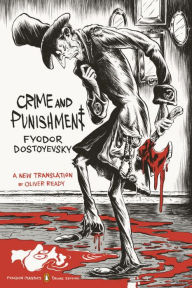
Technically, this is a reread for me. I taught the novel some ten years ago and haven’t read it again until now, as a selection in my AP Literature classes. But it is new in the sense that it’s a welcome new translation by Oliver Ready for Penguin Classics.
I’m never really sure how to go about “reviewing” a classic. The novel’s 150 years old. It has obviously stood the test of time in the sense that it still gets read. So I asked my students last week: “Is this novel still relevant today? And if so, why?” Their answers surprised me for how — despite not having enjoyed the novel — they could see why it’s worth reading today and how it’s universal.
It’s not a spoiler to say that the book’s about a crime and … wait for it … punishment. But to be honest, it’s not even really about the crime. That takes place in the opening section of the book. The remaining 80% is really about the nature of guilt and the psychology of the main character. And that’s where my students feel the book still has plenty to say.
Raskolnikov (the name itself means “schism” or “divided”) is torn between his philosophy of the extraordinary person who isn’t subjected to the same standards as ordinary people, and his humanity, which are at odds from the moment he commits his crime. The rest of the novel is the fascinating emotional and psychological battle he has with himself.
In many ways, it is about a society turned upside down, where the most Christian of all the characters has had to turn to prostitution, where two women (one somewhat evil, but the other decidedly not) both die needlessly. It’s social satire, but also a book driven by redemption. It’s not the easiest novel you’ll ever read, but it’s worth the effort.
I’m never really sure how to go about “reviewing” a classic. The novel’s 150 years old. It has obviously stood the test of time in the sense that it still gets read. So I asked my students last week: “Is this novel still relevant today? And if so, why?” Their answers surprised me for how — despite not having enjoyed the novel — they could see why it’s worth reading today and how it’s universal.
It’s not a spoiler to say that the book’s about a crime and … wait for it … punishment. But to be honest, it’s not even really about the crime. That takes place in the opening section of the book. The remaining 80% is really about the nature of guilt and the psychology of the main character. And that’s where my students feel the book still has plenty to say.
Raskolnikov (the name itself means “schism” or “divided”) is torn between his philosophy of the extraordinary person who isn’t subjected to the same standards as ordinary people, and his humanity, which are at odds from the moment he commits his crime. The rest of the novel is the fascinating emotional and psychological battle he has with himself.
In many ways, it is about a society turned upside down, where the most Christian of all the characters has had to turn to prostitution, where two women (one somewhat evil, but the other decidedly not) both die needlessly. It’s social satire, but also a book driven by redemption. It’s not the easiest novel you’ll ever read, but it’s worth the effort.
 RSS Feed
RSS Feed
